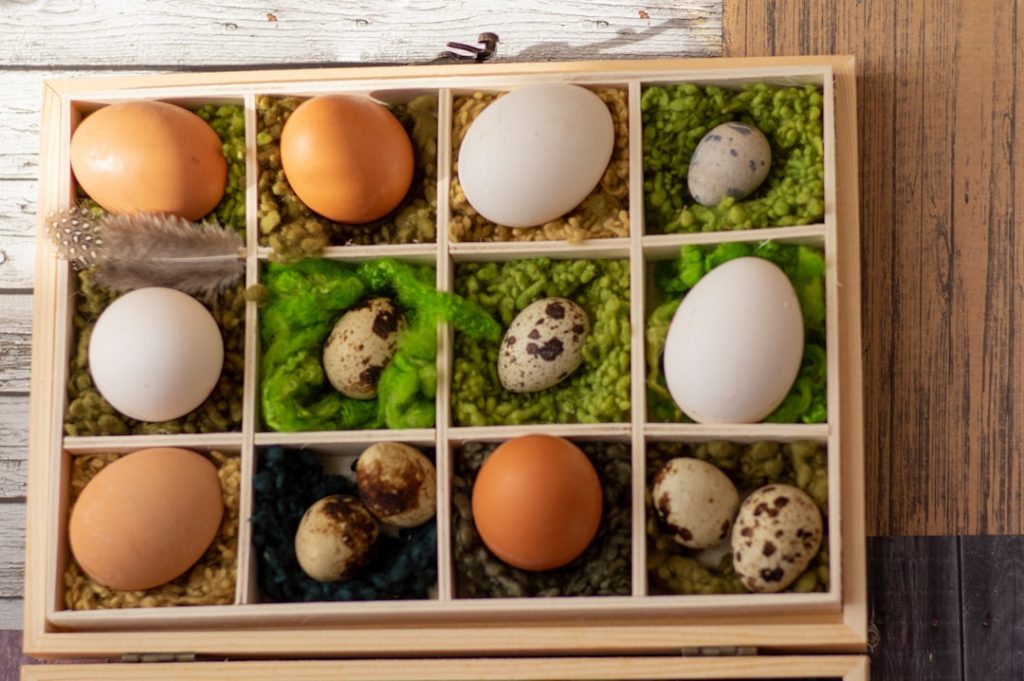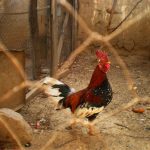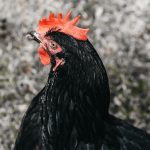When selecting chicken breeds for a backyard flock, several factors should be considered. Climate is a crucial element, as some breeds are better adapted to cold weather, while others thrive in warmer conditions. The intended purpose of the flock is also important, whether it’s for egg production, meat production, or companionship.
Breeds like Leghorns and Rhode Island Reds are known for high egg production, while Cornish Cross and Freedom Rangers are suitable for meat production. Temperament is another significant factor, especially for families with children or other pets. Some breeds are docile and friendly, while others may be more skittish or aggressive.
The available space for the flock should also be taken into account. Breeds like Sussex and Orpington are well-suited for larger areas with foraging opportunities, while Silkies and Bantams are more appropriate for smaller, confined spaces. Noise level is an important consideration, particularly in urban or suburban settings with close neighbors.
Some breeds are naturally more vocal than others. By carefully evaluating these factors, including climate, purpose, temperament, space requirements, and noise levels, flock owners can make informed decisions when selecting chicken breeds for their backyard.
Table of Contents
- 1 Coop Design and Maintenance
- 2 Feeding and Watering
- 3 Handling and Care
- 4 Health and Disease Prevention
- 5 Egg Collection and Storage
- 6 Predation and Protection
- 7 FAQs
- 7.1 What are the benefits of keeping chickens in the yard?
- 7.2 What are the basic requirements for keeping chickens in the yard?
- 7.3 How much space do chickens need in the yard?
- 7.4 What are some common predators of chickens and how can they be prevented?
- 7.5 What are some common health issues in chickens and how can they be prevented?
- 7.6 Are there any local regulations or ordinances to consider when keeping chickens in the yard?
Key Takeaways
- Choosing the right breed is essential for successful chicken keeping, considering factors such as climate, space, and egg production.
- Coop design and maintenance are crucial for the health and safety of the chickens, including proper ventilation, predator-proofing, and regular cleaning.
- Feeding and watering chickens require a balanced diet, access to fresh water, and proper feeding schedules to ensure their health and productivity.
- Proper handling and care of chickens involve gentle handling, regular health checks, and providing a clean and comfortable environment for them to thrive.
- Health and disease prevention are key aspects of chicken keeping, including vaccination, parasite control, and regular monitoring for signs of illness.
- Egg collection and storage should be done daily to ensure freshness, and proper storage techniques should be followed to maintain egg quality.
- Predation and protection measures are necessary to safeguard chickens from predators, including secure fencing, predator-proof coop design, and regular monitoring for signs of intrusion.
Coop Design and Maintenance
Coop Size and Ventilation
When designing your coop, it’s essential to consider the size and ventilation of the space. A general rule of thumb is to allow at least 2-3 square feet of space per chicken inside the coop, and 8-10 square feet per chicken in an outdoor run. This will ensure that your chickens have enough room to move around comfortably and engage in natural behaviors like scratching and dust bathing. Proper ventilation is also crucial to prevent moisture buildup and respiratory issues. You’ll want to include windows or vents that can be opened and closed as needed to allow for fresh air circulation.
Coop Maintenance and Cleaning
Keeping the coop clean is essential for the health and well-being of your flock. Regularly removing soiled bedding and replacing it with fresh material will help prevent the buildup of bacteria and parasites. This will also help reduce the risk of disease and keep your chickens healthy and happy.
Predator Protection and Pest Control
Regularly inspecting the coop for any signs of damage or wear and tear will help ensure that it remains secure and predator-proof. You’ll also want to regularly check for any signs of pests such as mites or lice, as these can quickly spread throughout your flock if left unchecked. By taking these precautions, you can help protect your chickens from predators and pests, and ensure a safe and healthy environment for them to thrive.
Overall, designing and maintaining a coop for your backyard flock is a crucial aspect of raising chickens and should be done with careful consideration to ensure the health and safety of your birds.
Feeding and Watering
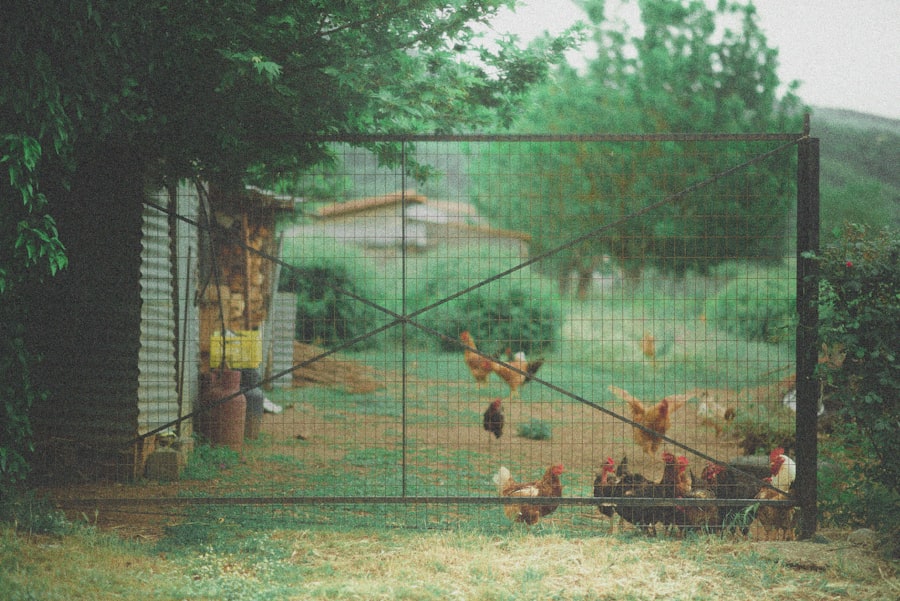
Feeding and watering your backyard flock is an essential part of their care and well-being. When it comes to feeding, it’s important to provide a balanced diet that meets all of your chickens’ nutritional needs. This typically includes a commercial feed that is specifically formulated for laying hens or meat birds, as well as access to fresh greens, grains, and kitchen scraps.
It’s important to provide a consistent source of high-quality feed to ensure that your chickens are getting all of the essential vitamins and minerals they need to stay healthy and productive. Additionally, providing access to fresh water at all times is crucial for your flock’s health and well-being. Chickens can quickly become dehydrated, especially in hot weather, so it’s important to regularly check their water supply and clean and refill it as needed.
In addition to providing a balanced diet and access to fresh water, it’s important to consider the feeding and watering setup for your flock. This typically includes feeders and waterers that are designed to prevent spillage and contamination. For example, hanging feeders can help prevent chickens from scratching bedding into their food, while nipple waterers can help prevent water from becoming soiled with bedding or droppings.
It’s also important to consider the placement of feeders and waterers within the coop or run to ensure that all of your chickens have easy access to food and water without overcrowding or competition. Overall, feeding and watering your backyard flock is an essential aspect of their care that should be done with careful consideration to ensure that they are receiving a balanced diet and access to fresh water at all times.
Handling and Care
Proper handling and care of your backyard flock is essential for their health and well-being. When it comes to handling chickens, it’s important to approach them calmly and gently to avoid causing unnecessary stress or injury. It’s best to handle chickens from a young age to help them become accustomed to human interaction, making it easier to handle them as they grow older.
When picking up a chicken, it’s important to support their body with both hands to prevent them from flapping or struggling, which can cause injury to themselves or you. Additionally, it’s important to be mindful of their behavior and body language when handling them, as this can indicate if they are feeling stressed or uncomfortable. In terms of care, regular grooming and health checks are important for maintaining the well-being of your flock.
This includes regularly inspecting their feathers, feet, and vent for any signs of injury or illness. Additionally, keeping their coop clean and free from pests is essential for preventing disease and maintaining a healthy environment for your birds. It’s also important to provide enrichment activities such as dust baths and perches to help keep your chickens mentally stimulated and physically active.
Overall, proper handling and care of your backyard flock is essential for their health and well-being and should be done with patience and attentiveness.
Health and Disease Prevention
Maintaining the health of your backyard flock is crucial for their overall well-being and productivity. One of the most important aspects of health maintenance is disease prevention. This includes implementing biosecurity measures such as quarantining new birds before introducing them to your existing flock, as well as regularly disinfecting feeders, waterers, and other equipment to prevent the spread of disease.
Additionally, it’s important to regularly monitor your flock for any signs of illness or injury, such as changes in behavior, decreased egg production, or abnormal droppings. In addition to disease prevention, providing a clean and comfortable living environment is essential for maintaining the health of your flock. This includes regularly cleaning their coop and run to prevent the buildup of bacteria and parasites, as well as providing access to fresh water at all times.
It’s also important to provide a balanced diet that meets all of their nutritional needs to ensure that they have a strong immune system. Finally, it’s important to establish a relationship with a veterinarian who specializes in poultry care so that you have access to professional advice and treatment if needed. Overall, maintaining the health of your backyard flock requires careful attention to disease prevention, cleanliness, nutrition, and access to veterinary care.
Egg Collection and Storage
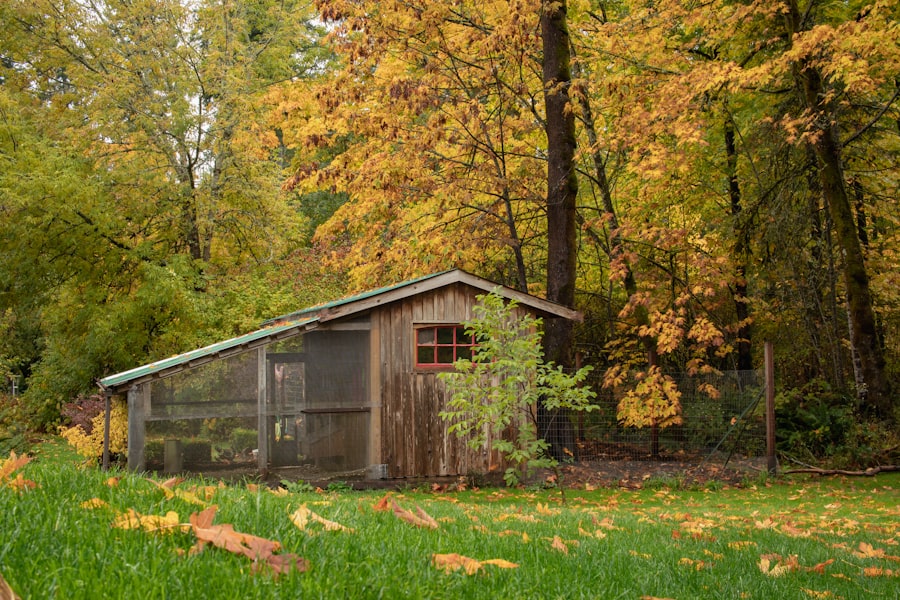
Establishing a Daily Routine
When it comes to egg collection, it’s important to establish a routine that allows you to collect eggs at least once a day to prevent them from becoming soiled or broken. It’s best to collect eggs in the morning when they are still fresh and before they have had a chance to become soiled by bedding or droppings.
Handling and Storing Eggs Properly
When collecting eggs, it’s important to handle them gently to prevent cracking or breaking, as this can lead to spoilage or contamination. Once you’ve collected your eggs, it’s important to store them properly to ensure that they remain fresh and safe for consumption. Eggs should be stored in a cool place away from direct sunlight and strong odors.
Optimal Storage Conditions
It’s best to store them with the pointed end down in an egg carton or container that allows for air circulation. This will help prevent moisture loss and maintain the quality of the eggs over time. It’s also important to regularly inspect your eggs for any signs of spoilage or contamination, such as cracks or unusual odors.
Maintaining Quality and Safety
Overall, establishing a routine for egg collection and proper storage is essential for maintaining the quality and safety of your backyard flock’s eggs.
Predation and Protection
Protecting your backyard flock from predators is an important aspect of their care and well-being. Common predators that pose a threat to chickens include raccoons, foxes, hawks, and even domestic dogs or cats. To protect your flock from predation, it’s important to implement measures such as securing their coop with sturdy locks and hardware cloth to prevent entry by predators.
Additionally, providing a secure outdoor run with a roof or netting can help prevent attacks from aerial predators such as hawks. It’s also important to consider other potential threats such as disease-carrying pests like rodents or wild birds that can introduce illness into your flock. Regularly inspecting your coop and run for any signs of damage or entry points for predators can help prevent attacks on your flock.
Additionally, providing roosts or hiding spots within their outdoor run can give your chickens a safe place to escape from potential threats. Overall, protecting your backyard flock from predation requires careful consideration of potential threats and implementing measures such as secure coops and runs to keep them safe from harm. In conclusion, raising a backyard flock of chickens requires careful consideration of factors such as breed selection, coop design and maintenance, feeding and watering setup, handling and care practices, health maintenance strategies, egg collection and storage routines, as well as predation protection measures.
By taking these factors into account and implementing best practices for each aspect of chicken care, you can ensure that your backyard flock remains healthy, happy, productive, and safe from potential threats.
If you’re interested in learning more about how to keep chickens in your yard, you may also want to check out this article on creating a garden chicken coop on PoultryWizard. This article provides helpful tips and advice on how to design and maintain a coop that is both functional and aesthetically pleasing for your backyard. (source)
FAQs
What are the benefits of keeping chickens in the yard?
Keeping chickens in the yard can provide a sustainable source of fresh eggs, natural pest control, and fertilizer for the garden. They also make great pets and can help reduce food waste by eating kitchen scraps.
What are the basic requirements for keeping chickens in the yard?
Chickens require a secure coop for shelter, a run for exercise, access to fresh water, and a balanced diet of chicken feed, grains, and kitchen scraps. They also need protection from predators and regular health checks.
How much space do chickens need in the yard?
Chickens need at least 2-3 square feet of coop space per bird and 8-10 square feet of outdoor run space per bird. It’s important to provide enough space for them to move around and exhibit natural behaviors.
What are some common predators of chickens and how can they be prevented?
Common predators of chickens include foxes, raccoons, hawks, and snakes. To prevent attacks, it’s important to secure the coop with sturdy fencing, lock the chickens in at night, and use deterrents such as motion-activated lights or sound.
What are some common health issues in chickens and how can they be prevented?
Common health issues in chickens include parasites, respiratory infections, and egg-laying problems. To prevent these issues, it’s important to keep the coop clean, provide a balanced diet, and monitor the chickens for any signs of illness. Regular veterinary check-ups are also recommended.
Are there any local regulations or ordinances to consider when keeping chickens in the yard?
Many cities and towns have regulations or ordinances regarding the keeping of chickens, including limits on the number of birds allowed, coop size and placement, and noise restrictions. It’s important to check with local authorities before keeping chickens in the yard.
Meet Walter, the feathered-friend fanatic of Florida! Nestled in the sunshine state, Walter struts through life with his feathered companions, clucking his way to happiness. With a coop that’s fancier than a five-star hotel, he’s the Don Juan of the chicken world. When he’s not teaching his hens to do the cha-cha, you’ll find him in a heated debate with his prized rooster, Sir Clucks-a-Lot. Walter’s poultry passion is no yolk; he’s the sunny-side-up guy you never knew you needed in your flock of friends!

